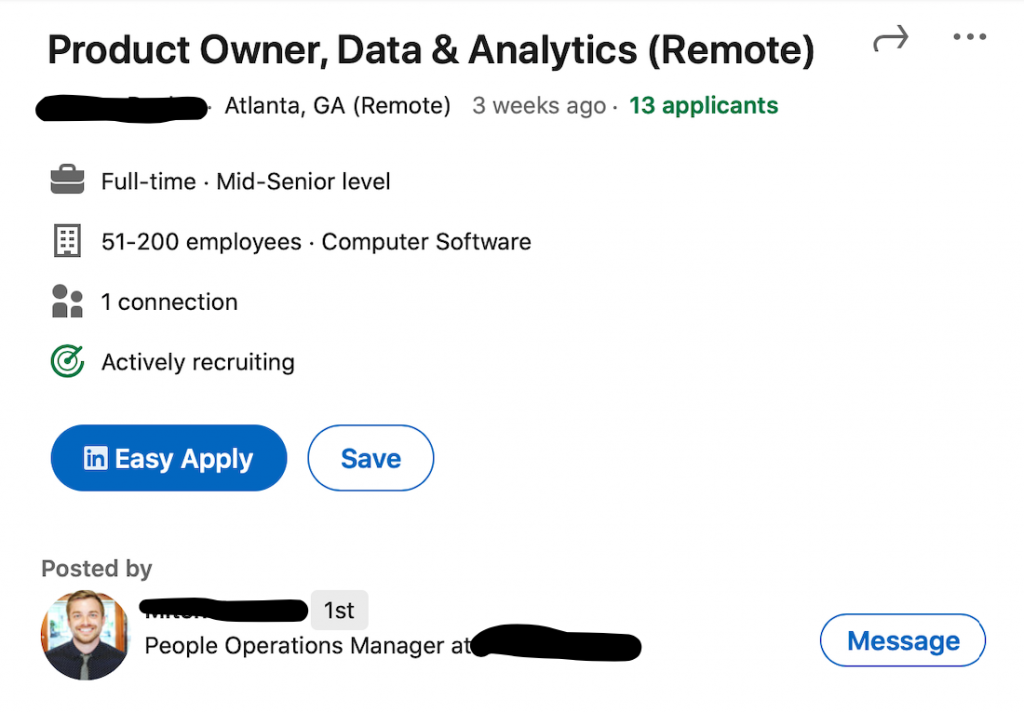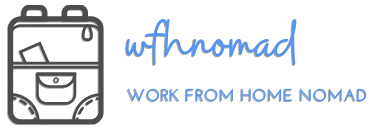*Corporate America Edition
Are you looking for a (new) job? I’ve written a blog post about my lessons learned from my first 4 job searches. I take a non-traditional approach to networking and seizing every tiny opportunity to turn it into a network of connections. To the rest of you – I’m curious to see if you have any differing opinions – please let me know because I would love to hear your strategies too!
My background
I didn’t particularly enjoy my first job and realized it wasn’t for me. I realized I wanted to work in tech, so I moved to San Francisco with no job offer lined up with the intention of pursuing jobs in that industry. So what did that mean? I had to network and create connections from thin air. I was surprised – I received a ton of help from people who genuinely wanted the best for me. After 3 months of cold messaging strangers, interviewing, and general continuous failures, I suddenly landed three job offers in one week.
Fast forward to the fall of 2021 during COVID when I had to job search and network all digitally and remotely. When I knew I was ready for a change, I applied very similar techniques and ended up landing three job offers in one week after about 5-6 weeks of pure job searching.
One of the biggest lessons learned for me is that it’s not always about how good you are at your job (unfortunately) but mainly about who you know and the overall job market. If you are looking for a job, you should be spending 60%+ of your time job searching by networking.
Ok – Networking. Who Should I Be Talking To?
There are three categories of people that can help you get the job you desire:
- Strong ties (people who you know well and who you’ve known for a long time)
- Weak ties (people you know of but don’t have a particularly super strong relationship)
- Complete strangers
Surprisingly, I’ve found that the group of people in #2 are the ones who can most likely help you land the job you want. Why? Because it’s the phenomenon of the Strength of Weak Ties.
Unless it’s your best friend or family member who can’t say no to you, Psychology tells us that Strong Ties are less likely to refer you to a job than a Weak Tie referring you. It can be overwhelming when a big ask happens like a job referral from somebody you know well. If the referred person ends up being a disappointing employee, then it’s a really poor reflection on the Strong Tie. But if it had been a Weak Tie that referred the bad employee, the Weak Tie could say “Oh, well I don’t really know that person. I just wanted to help.”
Therefore, I’ve found that leveraging Weak Ties and complete strangers have been incredibly helpful.
I’ve been on the other side of it. I respond to cold messages from strangers if they are nicely written and have a clear purpose. For example:
Hi Wilson. My name is Sean, and I notice you work at company XXX in the consulting space. I’m currently on internal projects and am very interested in transitioning into a consulting role in the tech industry. Would you be willing to hop on the phone sometime? I’m interested in taking a similar career path and would love to hear about your experiences. Thank you, Sean.
What a nice message. Of course I’d be more than happy to help because people have helped me in the past to get to the position I am in today.
How To Ask Someone for Help
The number one rule of networking is that it’s always ok to ask for help. In fact – I believe that the people who don’t ask for help tend to struggle.
The number two rule of networking is the most important one: Networking should never be transactional.
I’ve admittedly made that mistake a few times and have regretted it every time, because I deservingly got ghosted, and BAM – I’ve lost respect from that connection. What do I mean by transactional?
If you are looking for a job, don’t make that the point of talking to somebody because nobody owes you anything. You want to be smooth and genuine – ask for help because you are genuinely interested in a long-term career path in a particular field, and you want somebody to help you get started.
Here is an example:
“Hi Josh – I hope you’ve been well. I notice that you recently got a role at Company XXX. Congratulations! I’m currently exploring other job opportunities in ______. Would you be willing to chat on the phone sometime about your experiences there? I’m really interested in learning more about ______ after I browsed through the website. Thank you so much! -Wilson”
Why is it strong? Because a) you let the other person know you’re looking for another role b) you show genuine interest and are focused on learning more.
Here is an example of something that I would consider not smooth (it’s obvious you just want a referral and it comes off as very transactional):
“Hi Josh – I notice you are working at Company XXX. I have extensive experience working at ABC and think my skills would be a great fit. Please refer me to the position YYY. Thanks.”
The fun analogy is that it’s like if you were a single male and you are approaching a pretty girl at the bar. Your opener shouldn’t be “Hey, I saw you from across the room. Let’s go on a date.” You never know, some people like that lol, but your chances of receiving her number are much lower if you come off blunt and transactional.
Lastly, if someone offers to help you, never forget to genuinely say “Thank you”.
During the Phone Call
Prior to the phone call or the in-person meeting, you should have prepared a list of specific questions that are relevant to the company and role that you are interested in. If you ask thought-provoking questions, the chances of you convincing the person you are a good candidate are higher and the chances that the person will refer you are higher.
Assuming that you dropped the line “I’m currently exploring other job opportunities” in your message you sent to the person, you don’t need to restate it.
Some may disagree with me, but I think that would be overdoing it. If they agreed to hop on the phone in the first place, they understand you’re looking for a new job and that you would appreciate a referral.
If the person is uncomfortable referring you to the company, then they won’t offer it, and you shouldn’t push it. One more time and repeat after me – networking should NEVER be transactional.
My friend had a technique where he would drop the line at the very end of the phone call “Would it be ok with you if I shot you my resume to see if you had any tips and/or if you felt comfortable referring me to somebody you know?” It depends on how bold you are, but that can be risky.
Rejected? Rehash.
There is a strong chance that at one point you will be rejected at least once through a job searching process. The way we handle rejection is a huge opportunity to cash in on establishing future connections.
One time when I was job searching in San Francisco in 2017, I had a recruiter inform me that they were not going to move forward with my application. A normal reaction would be to feel sorry for yourself and be very discouraged. But instead, I told the recruiter,
“I really appreciate you taking the time to call me. I am disappointed to hear that my application isn’t going to move forward. However, I am really optimistic and excited about the possibility to land a similar position. I was wondering if you had some time to grab coffee with me sometime to discuss strategies for me to land a job in the industry that I’m really passionate about? I’d really appreciate it and would love to hear it from your perspective.
The recruiter agreed and we met up for coffee. Why? Because we are all human and we want motivated and passionate people to succeed. At the coffee meeting, I was prepared with questions, “hey, what do you typically look for in a resume?” and “what kind of personality would be a great fit for this role?”
At the end of the meeting, the conversation went like this:
Recruiter: Good luck, Wilson. I think it’s great you’re reaching out and showing genuine interest, and I’m sorry we can’t move forward with you at this time, but I’m happy to help in other ways. Is there anything I can do?
Me: Thank you so much. I was wondering if you’d be willing to introduce me to somebody in your network that could maybe answer some more technical questions about the role? I’m interested in learning more!
Recruiter: Absolutely. I’m not sure who off the top of my head. Hmm…
Me: Well, would it be ok if I went through your LinkedIn connections, give you a list, and if you feel comfortable introducing me to those people, would you be able to make an intro?
Recruiter: Sure!
After the meeting, I browsed through the recruiter’s LinkedIn connections, emailed the recruiter the next day of a few people working at my targeted companies. I was introduced to 3 of his connections and I met 2 of them for coffee, and 1 of them gave me a first round interview.
I hope the underlying theme makes sense because the point is that every single interaction can lead to a large number of new connections. Networking truly spreads like wildfire.
Every Ounce of Interaction Should be Thought as an Opportunity to Create Connections
Story time.
Back in 2017 when Uber pool was a thing, I got in the Uber while I was in Oakland. Then some girl got in the front seat and asked the Uber driver, “Can you take me to The City?”
I responded, “The City? Does that mean San Francisco?”
They both laughed and said yes, then proceeded to ask me where I was from. And of course, they naturally asked me what I was doing in the San Francisco Bay Area if I was from Oklahoma, so I dropped the line, “I came to San Francisco to look for a job, because it’s my dream to live here and work in the tech industry.”
The girl was so inspired by my story that she wanted to help me as much as she could. She worked as a fashion designer but she obviously had a lot of friends and connections working in the tech industry in the Bay Area. She gave me her LinkedIn and told me to let her know who I’d be interested in speaking to.
A few days later, I was introduced to her friend, John, at Salesforce and another friend at Google. John took me to the top of the Salesforce Tower during lunch and we oversaw the gorgeous panoramic view of the Bay Area. At the end, John told me to look through the careers website at Salesforce and to let me know which role I was interested in so that he could refer me.
The Other 40% – Marketing Yourself on LinkedIn + Job Fairs
The best tool is LinkedIn. It’s a great social network to interact with connections, connections of connections, and recruiters.
1. Pay for LinkedIn Premium
I think it’s especially important to have the ability to send InMail messages to strangers you would like to talk to. You get 5 included InMails per month. Use the sample messages I mentioned above.
You’ll also have the ability to directly message recruiters under job postings if the company lists the recruiter.

2. Let Recruiters Know You’re Open to New Opportunities
There should be a button to give you the option to let recruiters reach out to you that you are looking for a particular new role.

Make sure that is turned on.
3. Attach Resume to LinkedIn Page
Attach your resume to the Featured section as “Media”. I had my resume attached, and one time during an interview I asked a recruiter over the phone if she wanted my resume and she responded, “It’s ok, I already got it from your LinkedIn, and it looked great.”
Career Fairs and Job Fairs
If you are an alumni of a university, this should be a huge advantage. There should be virtual career fairs or in person alumni career fairs.
You should also be able to find certain Job Fairs for particular disciplines. For example, if you are a software developer, you should be able to attend software engineering job fairs locally (in a metropolitan city) or virtually.
Last But Not Least: Pay It Forward
If you ever have the opportunity to help your friend, a weak connection, or just a stranger, you should do it if they wrote a nice message showing genuine interest.
You have the right to not respond to any message the way anybody can choose to leave you on Read. But I’ve found that the concept of “helping each other” goes a long way.
In February 2021, I received a nice message from a fellow alumni (who was looking for a new job) asking if I could hop on a call. I agreed to chat with him and I wanted to help, not really thinking too much about it. Eight months later, I was looking for new opportunities, so I reached back out to the same person. He agreed to help me too and referred me to a role at his company. What if I had ignored his message in the beginning? He probably would have ignored mine, and that would have been a missed opportunity on my end.
If you help others without expecting anything in return, others will likely help you in the future.
Please check out Part 2 of the article – Interviewing!


Great post Wilson!